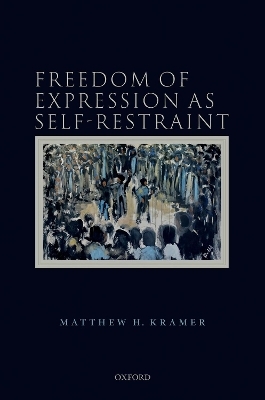
Freedom of Expression as Self-Restraint
Seiten
2021
Oxford University Press (Verlag)
978-0-19-886865-1 (ISBN)
Oxford University Press (Verlag)
978-0-19-886865-1 (ISBN)
This book argues for the absolutist position on the freedom of expression, and how this principle is integral for society. This title also explores some of the most common arguments regarding freedom of expression including pornography and banning advocacy of hateful creeds.
Freedom of Expression as Self-Restraint provides a novel justificatory foundation for the principle of freedom of expression. As the book argues, such a principle is absolute in that it is exceptionless; it imposes general duties that are binding always and everywere on every system of governance.
In addition to injecting a new level of philosophical sophistication into the debates over freedom of expression, the book ties the principle to an ideal of governmental self-restraint, and it shows how that ideal connects to the paramount moral responsibility of every system of governance: the responsibility to bring about the political, social, and economic conditions under which every member of society can be warranted in harbouring an ample sense of self-respect. In short, compliance by a system of governance with the principle of freedom of expression is integral to the fulfilment of that paramount responsibility.
Freedom of Expression as Self-Restraint provides a novel justificatory foundation for the principle of freedom of expression. As the book argues, such a principle is absolute in that it is exceptionless; it imposes general duties that are binding always and everywere on every system of governance.
In addition to injecting a new level of philosophical sophistication into the debates over freedom of expression, the book ties the principle to an ideal of governmental self-restraint, and it shows how that ideal connects to the paramount moral responsibility of every system of governance: the responsibility to bring about the political, social, and economic conditions under which every member of society can be warranted in harbouring an ample sense of self-respect. In short, compliance by a system of governance with the principle of freedom of expression is integral to the fulfilment of that paramount responsibility.
Matthew H. Kramer is Professor of Legal and Political Philosophy at the University of Cambridge, and is a Fellow of Churchill College, Cambridge. He is the Director of the Cambridge Forum for Legal & Political Philosophy, and he has been a Fellow of the British Academy since 2014. He is the author of 16 previous books and co-editor of 4 additional books.
1: Introduction: Philosophical Preliminaries
2: Components of a Theory of Freedom of Expression
3: Legitimate Restrictions
4: Governmental Self-Restraint and Individual Self-Respect
5: Pornography, Subordination, and Silencing
6: Hatred, Dignity, and Freedom of Expression
7: Conclusion: The Principle of Freedom of Expression in Practice
| Erscheinungsdatum | 16.03.2021 |
|---|---|
| Verlagsort | Oxford |
| Sprache | englisch |
| Maße | 166 x 241 mm |
| Gewicht | 706 g |
| Themenwelt | Recht / Steuern ► Allgemeines / Lexika |
| Recht / Steuern ► EU / Internationales Recht | |
| Recht / Steuern ► Öffentliches Recht ► Verfassungsrecht | |
| ISBN-10 | 0-19-886865-0 / 0198868650 |
| ISBN-13 | 978-0-19-886865-1 / 9780198868651 |
| Zustand | Neuware |
| Haben Sie eine Frage zum Produkt? |
Mehr entdecken
aus dem Bereich
aus dem Bereich
Buch | Hardcover (2024)
C.H.Beck (Verlag)
CHF 104,95


